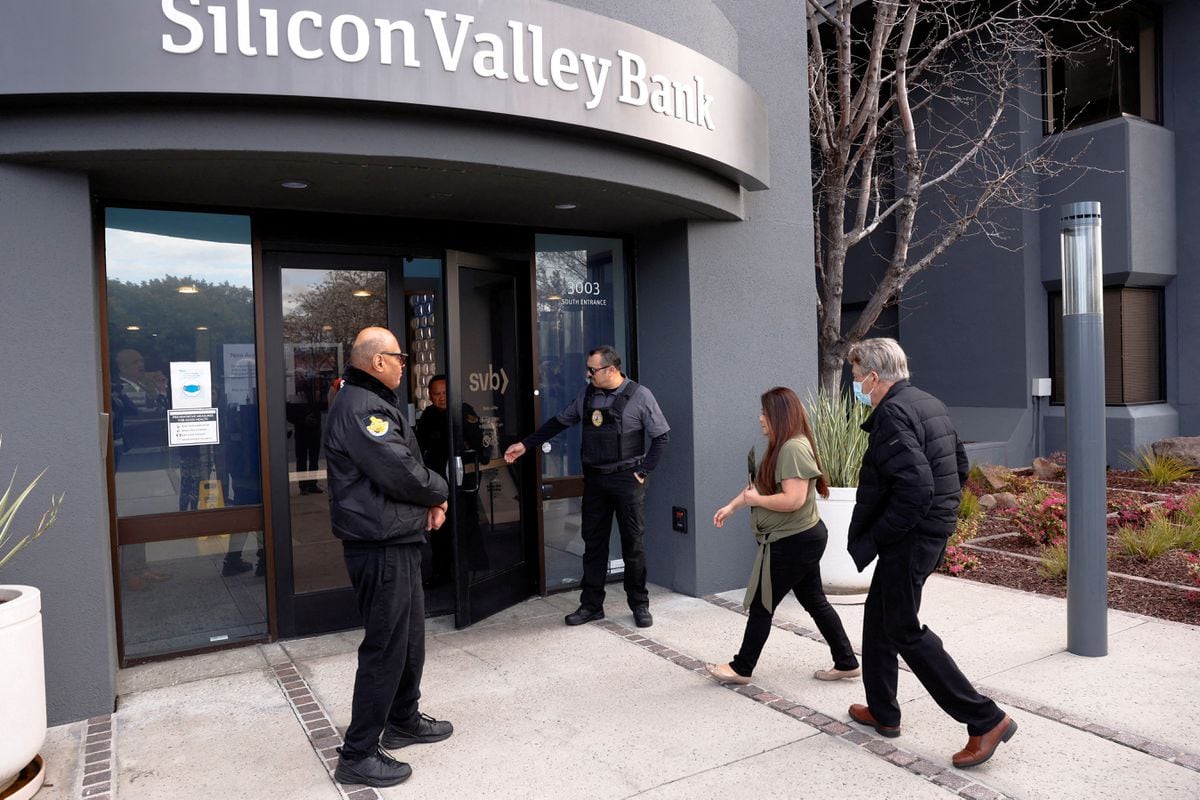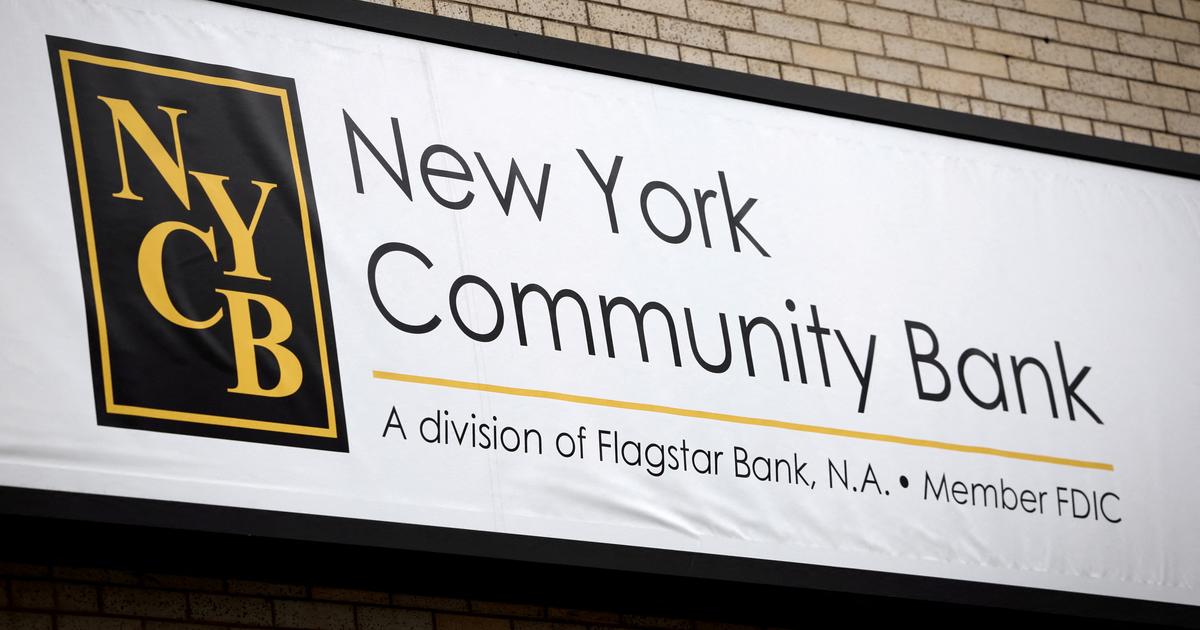The headquarters of the Silicon Valley Bank, in Santa Clara, California, on March 13. BRITTANY HOSEA-SMALL (Reuters)
After half a month of concern and expectation, Colombian
start-ups
are beginning to decide the outlook for the future after the sudden closure of Silicon Valley Bank (SVB) on March 10.
This newspaper gathered the testimony of five entrepreneurs who managed to rescue their deposits with transfers to other US entities to find out what the priorities will be in a sector where time runs so frantically that it gives the impression that there is little room for reflection.
The SVB, founded in California in 1983, used to be the place of choice for investors in venture capital and technology-based startups.
For this reason, on Thursday, March 9, one day before the authorities intervened in the bank, Daniel Bilbao, a 39-year-old from Cali, and leader of the Truora identity verification platform, did not believe the rumors that SVB was in the process of sinking: “I already knew that the stock had fallen 30%.
But at the same time I wondered, what is the chance that one of the 20 biggest ceases to exist?
A reflection that did not take long to be distorted, as the news about the massive withdrawals of funds followed one another in a cascade.
42,000 million dollars, one per second, over ten hours in the largest rout of deposits in a single day in recent US history.
Before 10 in the morning of that same Thursday, he began to transfer the money from his
start-up
to other banks and before 6 in the afternoon he had already saved the 12 million dollars of his capital.
In his opinion, the SVB crisis was not entirely predictable.
Bilbao, like the other interviewees, states that they have turned the page after that dizzying weekend.
But some nostalgia is perceived in the spirit of a group of young people, who do not pass the quarantine, convinced that the days of the stratospheric valuations of the companies, which did not correspond to their real growth, and the tons of dollars that fed for so many years the bonfire have come, for the moment, to an end.
Óscar Giraldo, a 39-year-old man from Manizal and founder of Playbox, a platform in charge of customer service software for companies such as Nubank or Meta (Facebook), defines it as "a downfall."
“After all the abundance and
boom
of the last few years,” he argues, “this forces us to focus on what really matters: solving customer problems, developing a clear company culture and not just creating a company to make us millionaires."
Regulators in the State of California had apparently known for some time that SVB was a sensitive case, but for reasons still to be clarified no action was taken.
Fabián Corredor, a 40-year-old from Boyacá and founder of Veci, a
fintech
that seeks to bring financial services closer to entrepreneurs, warns that the financial system had already received enough alarm signals, as happened with the fall of the 'dotcoms' at the beginning of the century : "There must be an urgent correction in the valuation of companies and in the way of investing in risk funds because if we continue with the current model, with swallow capital that migrates according to market intuitions, it will continue to be an obvious threat for the economic ecosystem.
Just months after the fifteenth anniversary of the bankruptcy of Lehman Brothers, the appetizer for the worst crisis that capitalism has suffered since the Great Depression of 1929, the parallels are inevitable, despite the fact that the scale of the two collapses are different : Lehman was the fourth largest investment bank in the United States, while SVB was the sixteenth by the size of its assets.
That is why Juan José Bello, a 27-year-old man from Manizal and co-founder of Porter Metrics, a platform that facilitates the collection and ordering of data, and which is used by 1,200 companies around the world, explains that on this occasion, more than the greed of bankers who they exceeded their functions, what has occurred is a confluence of "unfortunate events".
He especially highlights the constant interest rate hikes by the Federal Reserve in its quest to curb rising inflation.
“The price of money in the United States”, explains Bello, “is situated at 5%.
The burdens for investors are greater and raising capital for ventures is becoming more expensive.
The old Facebook mantra of 'move fast and break things' no longer works, and burning millions of dollars and having an overvalued company is not well seen”.
He also concedes that today being a
bootstrap
start-up, which are ventures that start with little capital and grow with their own income, is a "sexy" idea: "Today's narrative points to the most measured projects, where the returns are reasonable in a certain way and managers are betting on being much more efficient with their capital”.
In any case, Daniel Bilbao points out that it is not a collective anxiety, but rather one more challenge in a world in which crises seem to break out simultaneously without very long intervals: "The world is always ending up!
In the world of
start-ups,
one gets used to living like this and we generate a vision, perhaps, a little more zen.
Most founders are no longer thinking about Silicon Valley, there are other problems and we have moved on to the next thing.
But Fabián Corredor, whose platform to strengthen micro-enterprises already has 35,000 users, prefers to be cautious.
Companies that have accessed huge injections of capital through angel investors, seed capital or venture capital funds, the three basic sources for raising investment in a start-up, may be left with "little oxygen in this context where money is no longer available." It's free”: “They are going to have to focus all their efforts on generating income to survive, first, and then to grow.
The volume of millionaire investments they received in the past distorted their valuation and today it is unlikely that they will be able to raise so much money again in one round of investment.
They are exposed to lowering their valuation and affecting their investors”.
For Pablo Santos, a 38-year-old from Huila and founder of Finaktiva, a platform he describes as an "all-in-one" financial services for companies, the crisis can have "positive and enriching long-term" effects.
The liquidity of "excessive investments", he continues
Santos
,
they inflated the bubble of some of their costs.
For example, labor, marketing or commercial prices: "we misused users with promotions that are too aggressive to hook them".
As he labels that dying situation a “market degeneracy”, he now sees “the possibility of going back to basics”.
It proposes “companies that generate value for their environments, for their shareholders.
Use the capital to generate powerful solutions to real problems.
Make better use of the region's talent and be more creative without having to rely only on debt”.
In short, a change of principles in a sector accustomed to waste.
Bilbao concludes that, if in the last two or three years, the ecosystem has gone through the invasion of Ukraine, the worst health crisis in a century, and a season of economic instability capable of calling into question some distinctive features of the capitalist system, all that remains is accept that “there are things that one does not control”.
“What could be next?” He wonders: “An asteroid?
Well, we will have to face it in the best way”.
Subscribe here
to the EL PAÍS newsletter on Colombia and receive all the latest information on the country.





/cloudfront-eu-central-1.images.arcpublishing.com/prisa/MDDZP2GY4JH33JWLQTLLTJER6A.jpg)









